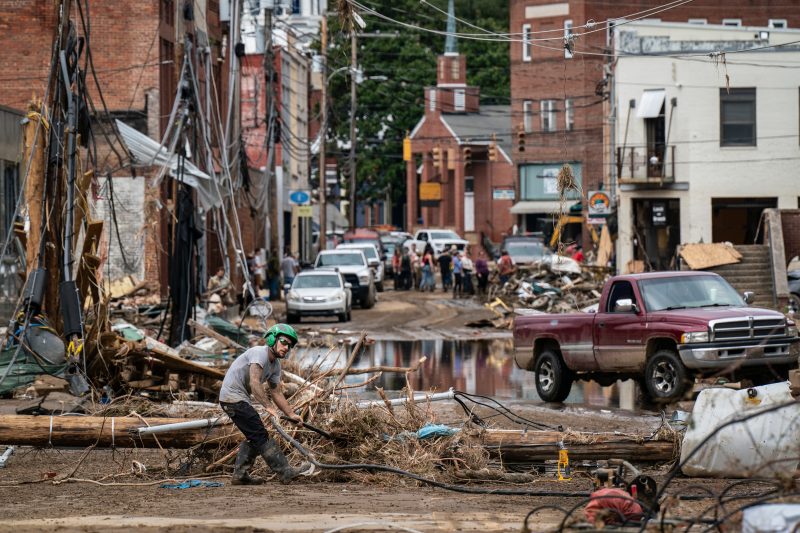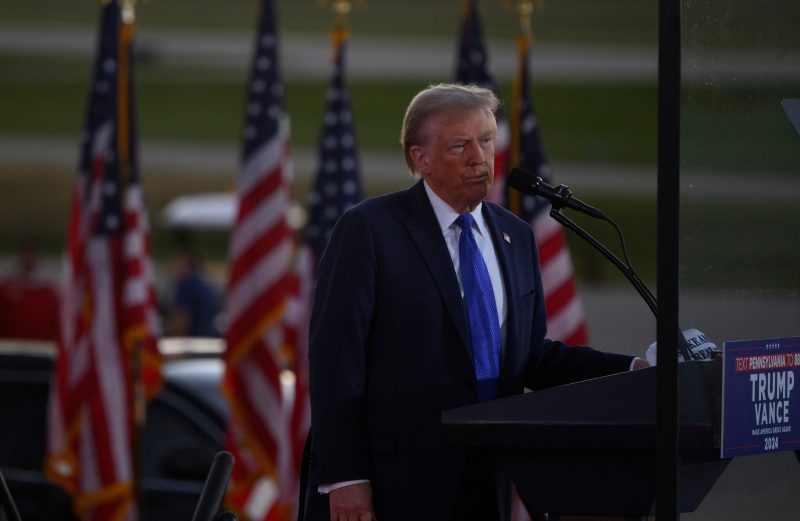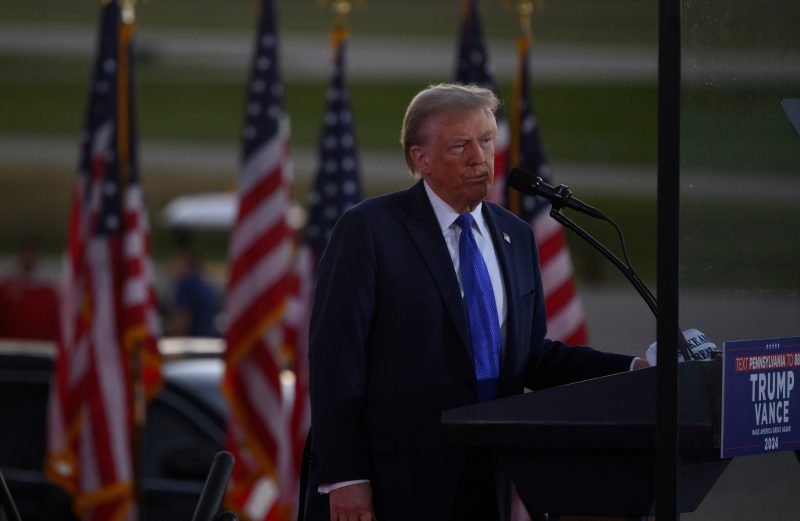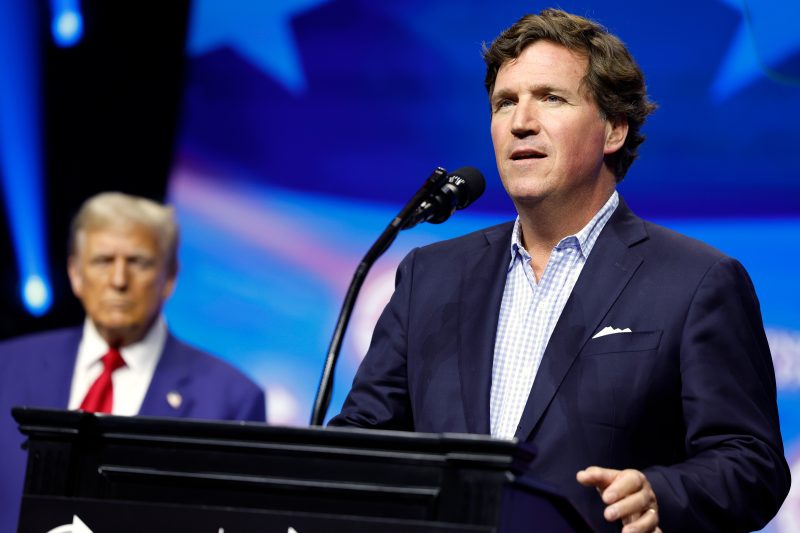
From flood to war, a campaign buffeted by unexpected events
Deadly flooding has cut off power and water in large swaths of the Southeast, and storm damage could hamper voting ahead of the election. A longshoremen strike briefly shut down ports along the East and Gulf Coasts, leading Democrats to panic. Bombs and assassinations have put the Middle East on the brink of a regional war. A judge unsealed a document outlining more details of the Jan. 6 assault.
With just over four weeks before Election Day, the country and the world have been consumed by chaos in ways that inject fresh volatility into a campaign season that has been filled with it, prompting both sides to seek advantage.
For nearly as long as presidential elections have been held, campaigns have lived in fear — or hope — of late developments that might alter the outcome. The term “October surprise” was coined in 1980 by a Ronald Reagan campaign operative, who warned that President Jimmy Carter would orchestrate a last-minute release of hostages in Iran to help him win the election. (The hostages were not released until after the election and Carter lost, but the warning was a strategic way to dampen the effect of the news if it did occur.)
In 2012, Hurricane Sandy devastated the East Coast, which limited campaigning in Virginia and New Hampshire and allowed Barack Obama to showcase the powers of the presidency and an image of bipartisanship with by hugging then-Gov. Chris Christie (R-N.J.), a moment Christie struggled to live down within his party.
In 2016, Republican Donald Trump’s campaign went into a tailspin after The Washington Post published a tape in which he bragged about sexually assaulting women, though he managed to recover, to the surprise of many on both sides. That same year, Democrat Hillary Clinton’s campaign was hampered by FBI Director James B. Comey’s announcement, 11 days before the election, that he was reopening an investigation into her use of a private email server.(The relatively quick announcement that investigation was being closed again did little to soften the impact.)
In the final weeks of the 2020 campaign, Trump tested positive for the coronavirus, hospitalizing him for several days and highlighting his struggle to protect the nation from the pandemic. On the Democratic side, the New York Post reported in the campaign’s final days on embarrassing material that purportedly came from the laptop of then-candidate Joe Biden’s son Hunter.
In this campaign, the unexpected events to date have largely been outside of the candidates’ control — at least since the bombshell of Biden’s exit from the race July 27. But how they respond, grapple with, or benefit from the developments could have far-reaching implications.
“We’re dealing with imponderables here,” said Republican strategist Karl Rove. “We saw this happen in how President Obama handled Hurricane Sandy. People thought he was empathetic and was on the spot. It allowed him to be seen as a strong, effective leader. Given that the race is so close, public reaction in parts of seven battleground states could have real consequences for the outcome of the election.”
The extensive flooding, rapidly spreading Mideast war and brief if perilous longshoremen’s strike have already affected the campaigns, disrupting schedules and shifting strategy. Harris had planned a bus tour in central Pennsylvania on Wednesday, but traveled to Georgia instead to witness and speak about the storm damage. The vice-presidential candidates, who had focused largely on domestic issues, opened their debate Tuesday by facing questions about Iran’s ballistic missile attack on Israel.
Even more recently, the Harris campaign has scrambled, attempting to showcase her ability to handle a crisis as Trump contends the administration has responded poorly to the hurricane’s damage.
On Monday, Harris cut short a Western swing to return to Washington, where she spoke at the headquarters of the Federal Emergency Management Agency. She was in the Situation Room for several hours on Tuesday, aides said, monitoring Iran’s strikes on Israel, and she traveled Wednesday to Augusta, Ga., to meet with storm victims.
The vice president has had the days of appearing aboard Air Force Two — coffee cup and briefing materials in front of her — and walking along storm-damaged areas clad in a jacket with the vice-presidential seal. Biden, asked on Friday how he thinks she is handling the chaotic developments, depicted Harris as a full partner.
“I’m in constant contact with her,” Biden told reporters at the White House. “We’re singing from the same song sheet. She helped pass all the laws that are being employed now. She’s a major player in everything we’ve done.”
But her campaign also appears to recognize the risk that she could take some blame even for events largely out of her control, particularly when facing an opponent with a history of capitalizing on chaos.
Some small-town officials say they have not seen government help, and critics have questioned why so many people are still stranded. Conservatives have complained that immigrants are being treated better than flood victims. Trump appeared for the second time in Georgia on Friday with Republican Gov. Brian Kemp, a political adversary with whom he recently made an uneasy truce.
In response, Harris’s team has highlighted that Republican governors are praising the administration’s performance. Gov. Henry McMaster (R-S.C.) during a Tuesday news conference said he had spoken with Biden, and he called the federal response from the Biden-Harris administration “superb.” Gov. Glenn Youngkin (R-Va.) praised Biden by name in a news release.
Kemp has spoken with Biden and publicly thanked him for his administration’s handling of the storm and its aftermath. But he has also said he is “outraged” that some rural areas of the state were not covered by Biden’s disaster declaration; Biden said Thursday he expected that ultimately “every county in the state will be approved.”
Trump was in Georgia two days before Harris, which his team saw as a political win. Biden and Harris said that state and local leaders had asked them not to visit immediately, to avoid interfering with emergency officials conducting rescue and recovery operations.
Trump’s running mate, Sen. JD Vance (R-Ohio), was in Virginia on Thursday, where he acknowledged FEMA had done a good job but said some of the storm’s victims were “forgotten.”
Josh Holmes, a Republican consultant, said Harris faces particular risk as part of an incumbent administration.
“None of these events are good,” Holmes said. “There is a way, with competent leadership, to make disasters work for you with the way you handle them. But when you have problems that have no easy answer and are getting worse, it’s never good for an incumbency.”
But there are downsides for Trump, too. Hurricane Helene left some of its greatest damage in rural North Carolina and Georgia, regions that are home to some of Trump’s strongest supporters.
Trump advisers have held several calls in recent days to discuss how to get these people to vote, thinking that they number in the hundreds of thousands. They also think some of the people are displaced and others are where mail service has stopped. Trump said Friday he was worried about lives, not votes.
“I don’t think people have come to understand how extensive the damage is,” Rove said. “Some are physically gone because their homes are wiped out, and others might have a response in how they see the government.”
Harris’s advisers are hoping to seize on recent events as a chance to showcase her as a potential commander in chief. Throughout last weekend, they began discussing altering the candidate’s schedule as the destruction from the hurricane became clear. By Sunday evening, she had decided to cancel events in Las Vegas and instead return to Washington. Harris plans to visit storm-hit parts of North Carolina on Saturday.
Her aides say they are not unduly worried about the hurricane’s political impact, and have seen it as an opportunity to show her responding to a crisis. She made the decision to go on solo trips to the region rather than jointly with Biden, with coordination so their trips did not overlap.
“Trump has not capitalized on this because he has no discipline,” said one Harris adviser, speaking on the condition of anonymity to discuss internal strategy. “We see it as stable versus chaotic, serious versus unserious, solution-oriented versus political. We feel good about that contrast.”
It has always been Trump’s central strategy to portray Biden — and now Harris — as a leader who let the country descend into chaos, with unchecked immigration, rampant inflation and soaring crime. All three of those indicators have fallen in recent months, in some cases dramatically.
“The World is on fire and spiraling out of control. We have no leadership, no one running the Country. We have a nonexistent President in Joe Biden, and a completely absent Vice President, Kamala Harris …” Trump said in response to questions from The Post.
Overseas, however, the war in the Middle East has only become wider and more dangerous.
Trump insists that major wars would cease if he were president, and that the Middle East in particular was safer during his administration. The Republican nominee has not said exactly how he would end the conflict, and he has sent mixed signals about his position, at times urging Israeli Prime Minister Benjamin Netanyahu to bring the war to a rapid conclusion, and other times saying he would support Israel for the long haul.
Harris, for her part, has tried to balance crosscurrents in her party. Monday will mark one year since the Oct. 7 attack in which Hamas militants invaded Israel and killed around 1,200 people and kidnapped more than 250. Israel’s counterattack has killed more than 41,000 Palestinians, according to the Gaza health ministry, triggering a humanitarian crisis that has reduced much of Gaza to rubble.
The war has reverberated in American politics, dividing Democrats and triggering widespread protests from Arab Americans who feel alienated by the party’s defense of Israel. Harris has signaled a slightly different approach from Biden’s, at times speaking more passionately about the plight of Palestinians, while saying Israel has a right to defend itself. She met on Friday with a group of Arab Americans during a campaign stop in Michigan.
The strike by the International Longshoremen’s Association strike this week was another reminder of how major events can surge unexpectedly into a campaign. If the strike had been prolonged, economists say, there could have been significant disruptions to the supply chain, triggering shortages and price spikes.
Harris tried to use the strike to her advantage, saying she supported the dock workers while Trump was hostile to blue-collar unions. Trump blamed Harris and Biden for the economic conditions that he said triggered the strike.
On Thursday night, the dock workers and port owners reached a temporary agreement, and the union agreed to end the strike until January while negotiations continue. Democrats also got a general economic boost Friday, with a surprisingly strong employment report showing that employers added 254,000 jobs in September and unemployment dropped to 4.1 percent.
“I want to applaud all involved for their efforts,” Harris said about the longshoremen agreement. “This step indicates progress toward a strong contract and represents the power of collective bargaining.”
One crisis, for now, off the table.



